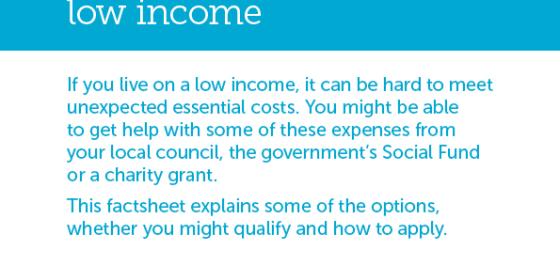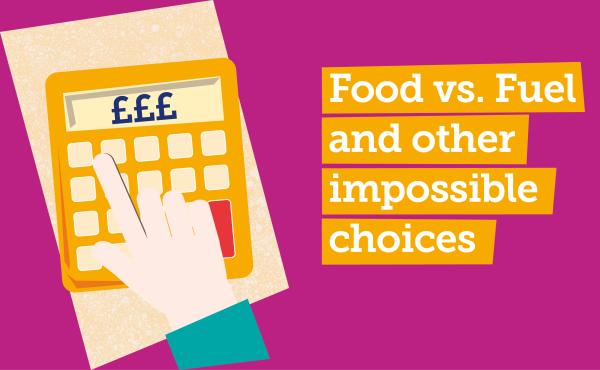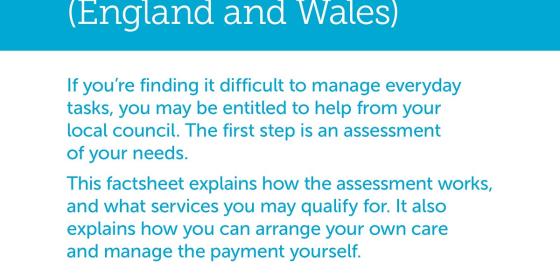
Older people are sometimes unable to access the food they need for a healthy and enjoyable diet. This can have a profound impact on both physical and mental wellbeing. The cost of older people’s malnutrition to the public purse is well-documented; it accounts for nearly £20bn of health and social care spending in England (BAPEN, 2015). There are multiple drivers for this poor access making it challenging, but very necessarily, to identify the specific income drivers and financial impact and develop a coherent response.
The barriers to eating well
What is less understood are the individual financial pressures around older people’s food. While pensioner poverty has reduced, the cost of food and/or preparing meals is partially driving poor nutrition among some older people, along with other factors such as lack of motivation or appetite.
Indeed, three million people over the age of 60 have reported skipping meals to cut back on food costs (ICM/Age UK, 2009).
Over one-third of people aged over 60 are worried about the cost of living and 27 per cent are worried about the cost of food (TNS/ Age UK, 2015). Furthermore, those from lower income households are more likely to experience ill-health or disability in older age and therefore more likely to require support, including with shopping, cooking or receiving meals that help them stay well-nourished.
Ensuring older people’s access to food must address the multiple barriers related to affordability, availability, poor health and lack of motivation or appetite. There are many positive solutions that offer multiple social and health benefits. Meals on wheels, shared meals such as lunch clubs or intergenerational meals, support with food shopping and preparing meals at home, as well as screening and advising on maximising nutrition should all be part of this multi-faceted response. This can also help to overcome isolation and provide opportunities for service providers to check in with people on their other needs.
Only through a range of options can we meet the range of needs and preferences of older people, particularly the oldest citizens, who are the most likely to face physical and other barriers to eating well.
Responding to the decline in meals on wheels
At Sustain, we are particularly concerned about the decline in meals on wheels provision. Fewer than half of councils now support a meals on wheels service, down from two thirds just a few years ago (IPSE/NACC, 2018). Yet the average cost of a two-course meals on wheels lunch is £3.60 (IPSE/ NACC, 2018). The cost-benefit of meal provision versus either a hospital stay or a move into a full-time care setting seems clear. But support around food falls into the same trap as other preventative interventions: acknowledged as a sensible idea that would save money in the long-term, but seen as ‘not fundable’ due to pressure on the annual budget. Another trap is that the costs generally transfer from councils (the meals provider) to the NHS (the hospital provider), with little mechanism to join up the thinking and budgeting to plan services in the most humane, preventative and cost-effective way overall.
We can’t necessarily turn back the clock to services of yesterday.
Fortunately there are a number of public and not-for-profit providers bucking the decline in food support for older people. Some are sustaining, and in some cases, growing services, through modernising their offer and diversifying their financial model, for example by offering supported employment or apprenticeships to make it easier for cost-effective food enterprises to flourish. Importantly, there is no one model for success – we have highlighted six diverse examples from around the UK. But to survive and thrive, services do need support from statutory partners to maximise referrals and to make meals affordable. For example, councils, health services, advice organisations, housing associations and others can maximise referrals to local services to reduce per-head costs. Furthermore, some older people pay VAT on the cost of their meals, putting them out of reach for some and making it harder for services to reach the required economies of scale. Councils can fix this by formally referring people to services, thereby making the meals VAT-exempt.
Learning from international approaches
Modern meals on wheels services from around the UK provide examples of the recognition of the multiple barriers to older people’s access too food, and practical steps that can be taken to ensure that older people do not fall into food poverty and malnourishment.
Yet even where these are working well, services are still vulnerable to funding shifts and policy change.
It appears that in some other countries, there is much a more coherent, coordinated and sustainable place-based response joining up multiple initiatives to ensure older people can access and afford a decent diet, with meals delivery part of this response. For example in South Korea, the government’s new social care policy includes meals delivery and in Milan, Italy a range of initiatives include meals delivery, assistance with shopping and research into the barriers people face in the local area. We can and should do better in the UK.
Simon Shaw is the Programme Manager – Food Poverty at Sustain: the alliance for better food and farming. He is also a Winston Churchill Memorial Trust 2019 Fellow and later this year he will travel to a number countries to research meals on wheels provision and wider support for older people’s access to food and then share findings widely.
Have you been affected by any of these issues? If you have been affected by any of the issues described in this blog, or simply need someone to reach out to, you can call Independent Age’s freephone Helpline for information and advice on 0800 319 6789. The views and opinions expressed in this article are those of the author and do not necessarily reflect the policy or position of Independent Age. |

